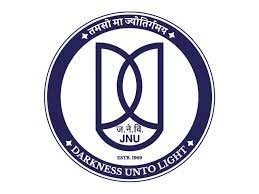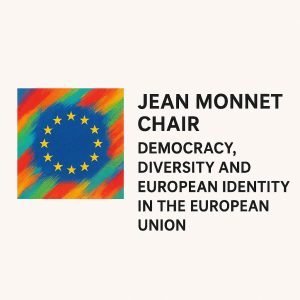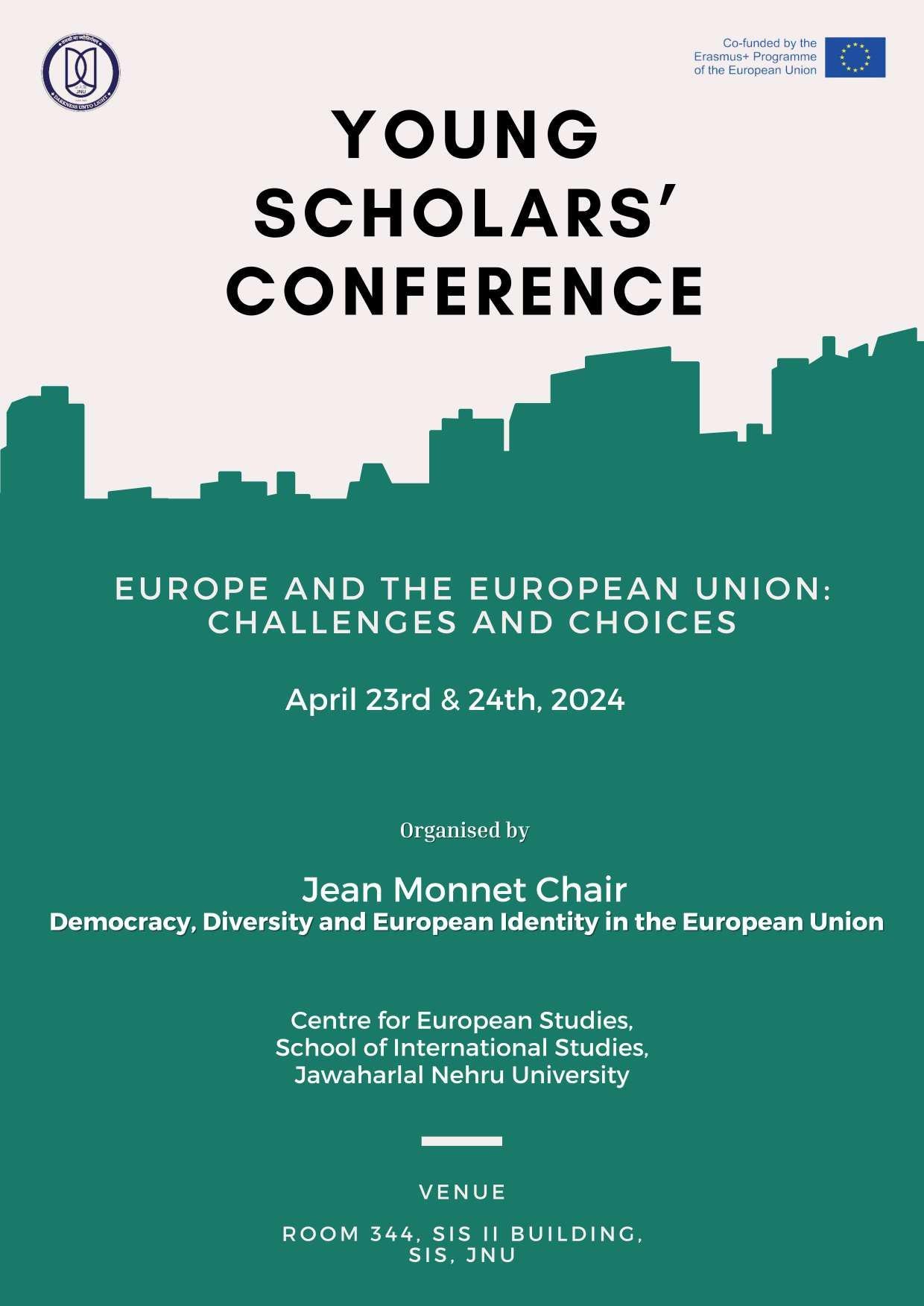
- This event has passed.
Young Scholars’ Conference “Europe and the European Union: Challenges and Choices” 23 & 24 April 2024




Young Scholars’ Conference
Europe and the European Union: Challenges and Choices
23 and 24 April 2024
Concept Note
The contemporary landscape of Europe is marked by a complex interplay of ongoing challenges and critical choices.
Europe’s internal landscape is characterised by a rise in populism, Euroscepticism, and anxieties surrounding migration, security, and national identity. This is evident in the electoral performances of populist parties in several countries, such as the Alternative for Germany (AfD) in Germany and the National Rally in France. These sentiments often challenge the core principles of the European Union, raising questions about the future of integration and its ability to foster a sense of shared European identity.
Beyond these challenges, Europe is also grappling with significant socio-economic concerns. Inflation is on the rise, impacting citizens’ purchasing power and raising concerns about social cohesion. Additionally, the war in Ukraine has triggered an energy crisis, highlighting the continent’s dependence on Russian energy supplies and prompting discussions on diversifying energy sources and accelerating the transition towards renewable energy. These issues, coupled with the lingering effects of the COVID-19 pandemic, have exacerbated existing inequalities and exposed vulnerabilities within the Eurozone. The security landscape has been fundamentally altered with debates on the structures of European security and widespread reports of human suffering. These circumstances have led to a renewed focus on defence spending and a re-evaluation of NATO’s role in guaranteeing European security.
Further complicating the security landscape are the ongoing tensions in the Eastern Mediterranean, exemplified by the recent escalation of the Israel-Palestine conflict. This, along with the potential for instability in regions bordering Europe, such as the Balkans and the Sahel, presents a complex web of security challenges that demand a coordinated and multifaceted response from the EU and its member states. In addition, the upcoming US elections and the possibility of a shift in American political leadership add another layer of uncertainty to the global and transatlantic landscape.
In the face of these multifaceted challenges, the EU stands at a crossroads. While internal divisions and external pressures pose significant obstacles, the current moment also presents opportunities for growth and transformation. The war in Ukraine has underscored the need for a stronger and more united EU, capable of acting as a global leader in promoting peace and security. This necessitates a renewed commitment to European values, including democracy, human rights, and the rule of law. Furthermore, the economic and energy crises presented an opportunity for the EU to accelerate the green transition and foster sustainable economic growth.
The upcoming European Parliament elections 2024 will also be a critical test for the EU. These elections will determine the political direction of the Union and its ability to address the challenges highlighted above.
Given these developments, the Centre for European Studies is organising a two-day Young Scholars Conference on the theme “Europe and the European Union: Challenges and Choices” on 25 and 26 April 2024. The Conference aims to provide a platform for in-depth discussions by young researchers across India on the complex challenges and crucial choices facing Europe today. Through engaging presentations, insightful discussions, and thought-provoking exchanges, young researchers will have the opportunity to contribute their unique perspectives and explore potential solutions to the multifaceted issues shaping the continent’s future.
The Conference invites abstracts from young scholars for original unpublished papers which respond but are not limited to the following subthemes:
- EU and Contemporary Challenges in Geopolitics
- Addressing Diversity and Identity Issues
- Immigration, Integration and Internal Security
- European Society and Politics
- Nationalism and Populism in Europe
- EU and the Security Framework post-Ukraine War
- Globalisation and Growing Economic Interdependencies
- Climate Change, Green Energy and Sustainability
- Emerging Technologies and Cyber Security
Papers will be selected based on the abstracts (a maximum of 250 words with up to six keywords) to be submitted by March 18, 2024, to ceusconference2021@gmail.com. The conference committee will review all submitted abstracts and communicate their decisions regarding the acceptance of proposed papers by March 25, 2024. For any queries, please reach out to the Organising Team at ceusconference2021@gmail.com.
Convenor
Prof. Bhaswati Sarkar
Jean Monnet Chair,
Professor, Centre for European Studies, SIS, JNU
Co-Convenor
Dr. Ankita Dutta
Assistant Professor
Centre for European Studies
SIS JNU

Please scan the code to access the Google form for abstract submission.
Event Report
The two-day Young Scholars Conference on the theme “Europe and the European Union: Challenges and Choices” was held on 23 and 24 April 2024. The Conference aimed to provide a platform for in-depth discussions by young researchers across India on the complex challenges and crucial choices facing Europe today. Through engaging presentations, insightful discussions, and thought-provoking exchanges, young researchers contributed their unique perspectives to the multifaceted issues shaping the continent’s future.
The Inaugural Session began with Prof. Sarkar introducing the conference theme and the eminent speakers. She emphasised how YSC gave a forum for the exchange of work of young scholars and elaborated on how the theme was determined by looking at the multiple challenges faced by the EU (pandemic, war, divergent perspectives on the Gaza situation). Following her introduction, Prof. Ummu Salma Bava, Chairperson, CES, expressed her gratitude to the guests. She remarked that SIS, particularly the CES, is a great knowledge base, and the conference will become a new resource base. Speaking on the theme of the conference, she said it is pertinent to discuss the limits of cooperation and how challenges are reimagined. Prof. Amitabh Mattoo, Dean, SIS, also addressed the commendable work of CES, expressing his thoughts on how the EU will respond to the rising challenges on its doorsteps.
In the Inaugural Session Prof. Santishree Dhulipudi Pandit, Vice Chancellor, JNU addressed the gathering, highlighting JNU’s excellent national and international rankings stressing on how the university provides a great intellectual place for students and researchers. She further expanded on the difference in threat perceptions between the EU and India based on their national interests. Post her address, Amb. Reuben Gauci, High Commissioner, High Commission of Malta, delivered the special remarks where he highlighted Malta’s role in international politics and the issue of small states being exploited by big powers in geopolitics. He ended his address by mentioning the shared journey of Malta and India in their perception of certain events and issues.
Following his special remarks, Ambassador Sajjanhar talked about his association with the Centre, lasting 20 years. He added his perspective on the Ukraine war and how its conclusion will determine the European security architecture. Speaking on the energy challenges, he praised Europe’s resilience in finding innovative solutions. He also articulated that China will remain a challenge for the EU in terms of human rights, weaponisation of economics and supply chains, and support for Russia. He concluded by mentioning the partnership between India and EU, which has been strengthened recently.
Mr. Seppo Nurmi, Minister, And Chargé d’Affaires, Delegation of the EU to India and Bhutan, in his keynote address, focused on the current status of EU – India relations. He remarked that he believed the challenges faced by the EU are not specific to Europe but that every country has to face them. He also talked about the necessity of furthering the EU and India’s common interests and expressed the EU’s interest in furthering trade ties with India and how the expansion of trade will benefit both sides. He ended his address by mentioning that the EU’s engagement is not just limited to the bilateral relationship but also encompasses the Indo-Pacific region. With the esteemed guests of the event sharing their insights on the current issue and the theme of the conference, Dr. Ankita Dutta, Assistant Professor, CES, SIS, JNU, concluded the inaugural session by giving the vote of thanks.
The working sessions of the conference began thereafter, with the first theme being ‘Euro enthusiasts to Euro sceptics’ chaired by Professor, Centre for European Studies, SIS, JNU and Jean Monnet Chair. The working session focused on the spectrum from Euro enthusiasm to Euroscepticism, highlighting the shift in political attitudes within the EU. Discussions included the role of the Catholic Church in Poland’s political landscape, especially post-2015 with the Law and Justice Party’s alignment, and Poland’s increasing significance amid geopolitical shifts like the Russian invasion of Ukraine. Additionally, the session covered challenges faced by the Visegrad Four and examined Hungary’s nationalism under Viktor Orban’s policies.
Working Session II was on the theme ‘Geopolitical Quagmire’ chaired by Dr J. Jeganaathan, Associate Professor, Centre for European Studies, SIS, JNU. The session focused on the effectiveness of EU sanctions on Russia, covering impacts on military, cryptocurrency, and raw materials. Discussions also emphasised EU-ASEAN cooperation in the Indo-Pacific for economic and security stability, media influence on EU-China relations, and the EU’s evolving role in the Indian Ocean and Arctic geopolitics. The analyses provided a pragmatic overview of the EU’s strategic involvement in global geopolitics and security.
Working Session III, titled ‘Quicksand of Populism’ chaired by Dr Satya Narayan Prasad, Associate Professor, Centre for European Studies, SIS, JNU, explored the rise of right-wing parties in Europe as a temporary phenomenon influenced by historical factors, such as the failure of communist governments. Presentations analysed the effects of populism on European unity, including its influence on Poland and Hungary’s support for Ukraine and the populist roots and implications of Brexit. Discussions also covered Germany’s transition from pacifism to assertiveness in foreign policy and the growth of the far-right party AFD.
Working Session IV on the second day of the conference was chaired by Prof. Ummu Salma Bava, Professor, Centre for European Studies, SIS, JNU and Jean Monnet Chair on the theme ‘Restructuring Defence and Security Landscape in the EU’ addressing the contemporary security challenges, including EU-India maritime cooperation to secure trade routes and EU-NATO collaboration against hybrid threats and warfare. Discussions highlighted the EU’s foreign and security policy shifts post-Cold War and its responses to crises like the Ukraine conflict, as well as strategic challenges in the Arctic and policy adaptation amid climate change and militarisation. The transition of Sweden and Finland to NATO membership in response to Russian aggression was also examined, reflecting on historical shifts and public sentiment, showcasing the evolving security framework in Europe.
The Working Session V on the theme of ‘Exploring identity issues in the EU’ was chaired by Dr Teiborlang T. Kharsyntiew, Assistant Professor, Centre for European Studies, SIS, JNU, who stressed the significance of this theme in light of identity becoming a critical contemporary issue due to demographic changes, entry of new workers in the labour market and the arrival of migrants in the continent. The presentations included discussions on scholarly engagement on Muslim Imams in France, the progression of Hungarian nationalism and how Orban has utilised various symbols to shape the same, a comparative analysis of the Sami community in Europe and the Banjara community in South Asia in terms of empowerment.
Working Session VI was on the theme ‘Emerging Themes in the European Union’ chaired by Dr Ankita Dutta, Assistant Professor, Centre for European Studies, SIS, JNU. The session covered diverse issues beyond migration, such as AI regulation and the European Super League. Discussions highlighted the EU’s lack of consensus on migration, cross-border policy cooperation, challenges posed by the EU AI Law amid global competition, and the complexities of extraterritorial migration management. The analysis of the European Super League underscored concerns about monopoly and competition, showcasing the multifaceted nature of current and future EU challenges.
Working Session VII was on the theme ‘Energy, Climate Issues and Development Assistance’ chaired by Dr Sakti Prasad Srichandan, Assistant Professor, Centre for European Studies, SIS, JNU. This session focused on Europe’s evolving energy and climate policies, emphasising the growing momentum around hydrogen as a sustainable energy source. Presentations compared the differing climate policy approaches of the Nordic region and the EU, highlighting their unique paths and challenges. Additionally, the discussion covered Norway’s development assistance strategies in the post-Cold War period, showcasing its policy evolution and international aid focus.
The working sessions and presentations concluded with the Valedictory session. Prof. Bhaswati Sarkar shared her concluding remarks where she expressed gratitude to all participants for their insightful contributions. She emphasised the critical importance of the issues discussed, particularly in light of Europe’s current challenges, including the war in Ukraine, the energy crisis, and concerns about social cohesion. Prof. Sarkar urged participants to consider the broader context of these issues and to explore avenues for further debates and possible routes of solutions that promote global cooperation in issues that affect Europe and, subsequently, the relations between Europe and India. She expressed hope that the conference would foster a deeper understanding of Europe’s role in the world and its impact on global affairs. The valedictory address was delivered by Dr. Raffaela Puggioni, Jean Monnet Chair, School of International Affairs, O.P. Jindal Global, Sonepat, who expressed her gratitude for being able to witness some of the thoughts shared by the scholars and debates on pertinent issues concerning Europe in the contemporary times. The conference culminated in a certificate distribution ceremony where Dr. Puggioni and Prof. Sarkar personally congratulated each presenter, recognising their hard work and insightful contributions. Ravneet Kaur Bhogal, a Research Scholar at the Centre for European Studies, delivered a heartfelt vote of thanks, expressing appreciation to all who made the event a success.
